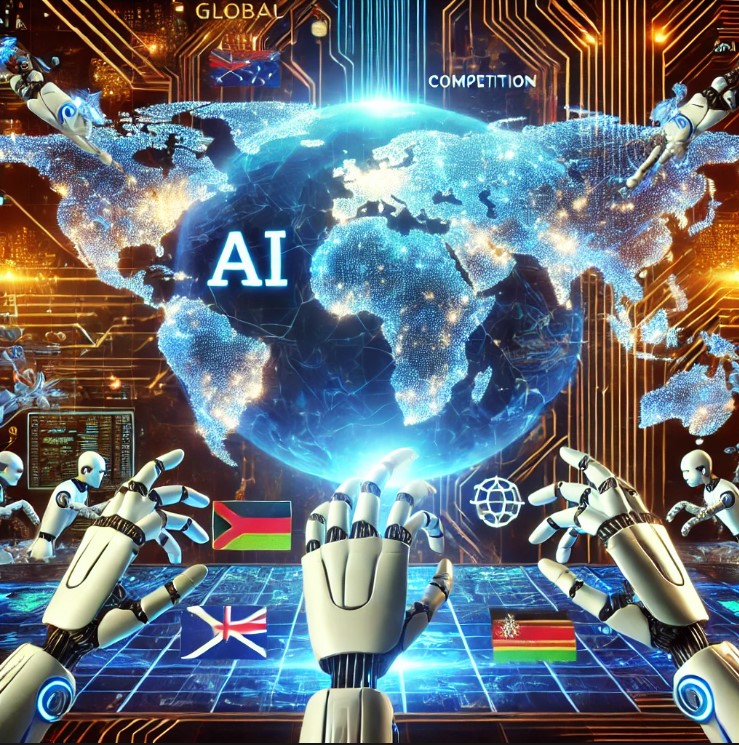
Artificial Intelligence (AI) is no longer just a technological breakthrough—it has become a geopolitical and economic battleground. AI global competition is driving governments and corporations to invest heavily in research, infrastructure, and talent to gain a competitive edge. This article explores how AI global competition is shaping policies, business strategies, and future innovations.
AI Global Competition: The Race for Technological Leadership
AI global competition is defining the future of global leadership. Countries and companies are investing in AI to secure economic power, strengthen national security, and lead in technological advancements.
Economic Impact of AI Global Competition
AI-driven industries contribute billions to national economies. Countries leading AI development benefit from increased productivity, job creation, and industry growth. According to McKinsey & Company, AI could contribute $13 trillion to the global economy by 2030.
AI and National Security in the Global AI Race
Governments view AI as essential for cybersecurity, intelligence, and defense. Nations like the United States and China have integrated AI into military applications, enhancing surveillance and cyber defense capabilities. The Brookings Institution reports that AI plays a critical role in modern warfare strategies.
Explore how AI is transforming medicine here.
How Governments Are Driving AI Global Competition
Governments worldwide are investing heavily in AI to maintain a competitive edge and secure leadership in innovation.
The United States’ AI Strategy in the Global Competition
The U.S. government has prioritized AI funding, emphasizing defense, research, and private sector collaboration. Organizations like the National Science Foundation (NSF) allocate billions annually to AI research. Additionally, the Pentagon is incorporating AI into defense operations to enhance national security.
China’s AI Ambitions and the Global AI Race
China’s state-backed AI initiatives aim for global dominance by 2030. The country has invested in AI startups, established research hubs, and developed policies to support AI adoption. According to Harvard Business Review, China’s AI research output has surpassed that of the U.S., positioning it as a leader in the field.
The European Union’s AI Approach to Global Competition
The EU is focused on AI regulations and ethical considerations, aiming to balance innovation with privacy protection. The General Data Protection Regulation (GDPR) influences AI policies, ensuring responsible data use. The European Commission has proposed AI laws to promote transparency and accountability.
Read more about AI regulation and policy in the EU
AI Global Competition: Businesses at the Forefront
Technology giants are actively shaping AI development through innovation and strategic investments.
AI in Cloud Computing and Enterprise Solutions
Companies like Microsoft and Google are competing in AI-driven cloud computing. Their AI-powered cloud platforms enhance enterprise solutions and digital transformation. Forbes highlights that cloud AI services are a key driver of corporate AI adoption.
AI Hardware and Infrastructure in the Global Market
NVIDIA dominates AI hardware development with cutting-edge GPUs that power AI applications. The company’s AI chips accelerate machine learning and deep learning advancements, providing the computational power necessary for AI breakthroughs.
AI Research and Development in the Competitive Landscape
Organizations like OpenAI and Anthropic are pushing AI research boundaries. These companies are developing state-of-the-art AI models that drive advancements in natural language processing, robotics, and automation. According to MIT Technology Review, AI startups are receiving unprecedented funding to expand innovation.
Challenges in AI Global Competition
Despite rapid progress, AI development faces several challenges that impact its growth and adoption.
Ethical and Regulatory Concerns in AI Competition
Balancing AI innovation with ethical considerations is a key issue. Governments and organizations must establish policies to prevent AI misuse, bias, and discrimination. The World Economic Forum emphasizes the need for AI ethics frameworks to ensure fairness and accountability.
AI Talent Shortage and Workforce Challenges
The demand for AI expertise surpasses the supply of skilled professionals. Universities and companies are investing in AI education to bridge the talent gap. Stanford University reports that AI-related job postings have surged, highlighting the need for skilled workers.
Geopolitical Tensions and Trade Restrictions in AI Development
AI-related trade restrictions and geopolitical tensions impact international AI collaboration. The U.S.-China AI rivalry has led to restrictions on AI technology exports, affecting global AI research. According to The Financial Times, AI-related sanctions could reshape global supply chains and innovation ecosystems.
Learn more about AI trade policies and their impact
Conclusion
AI global competition is reshaping economies, national security, and technological advancements. As governments and corporations race for AI leadership, the stakes continue to rise. The nations and businesses that successfully navigate AI development and regulation will hold a significant advantage in the coming decades. As AI evolves, its impact on industries, governance, and global power dynamics will only intensify, making AI global competition a defining factor in the future of innovation.
